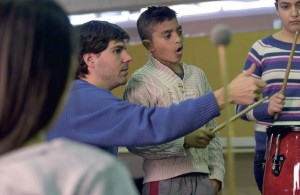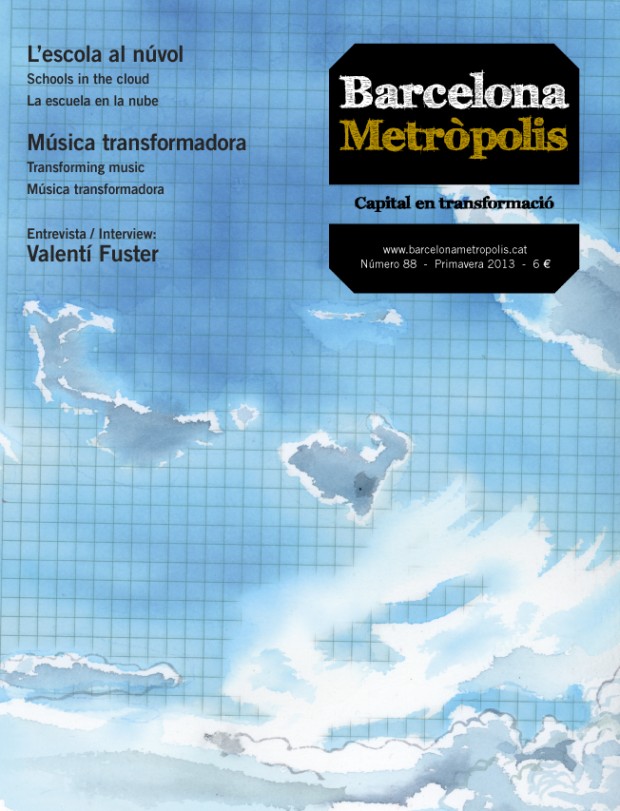The Argentine musician Pablo Pérsico, who has been living and working in Barcelona since 2007, is the driving force behind a new educational system, Integrasons, which has created two children’s and youth orchestras in Badalona and Poble-sec.

© Arxiu Integrasons / Marta Pich / SGAE
The Do d’Acords Orchestra during the concert they gave in June last year, in partnership with the OBC string quartet, at the Artèria auditorium on Avinguda Paral·lel.
In all orchestras there comes a moment when the soloist goes out on a limb. What would happen if they sounded off? The whole group, the whole piece, would be jeopardised. This moment, recorded in a musical score and performed at a given moment in our present, sums up the educational project created by the Argentine composer Pablo Pérsico. A new methodology based on the possibility that one day we will have to give our all with a whole orchestra behind us and an audience in front of us. When I first heard the Barris en Solfa orchestra I was reminded of Mireia Farrés, solo trumpeter with the OBC, playing the opening notes to Mahler’s Fifth Symphony with a full orchestra behind her almost in silence. How do you launch a boat that will later have to switch to cruising speed?
Barris en Solfa, conducted by Pablo Pérsico himself, comprises of fifteen children from different backgrounds, each of whom has between five to six different instruments. They are all unique and fascinating instruments – a didgeridoo, guaguatub, xylophone, Chinese harp, bongo, maracas, etc. Today we are watching the orchestra rehearse. Each child follows Pablo Pérsico’s instructions depending on what they are listening to at the time and chooses an instrument. The maracas are just as important as the xylophone. Or vice versa. The idea is to choose the most appropriate sound based on what the rest of their friends are doing. The methodology encourages the children to make mistakes, which should not be feared but rather integrated into the experience.
Collective improvisation is something that is far removed from official school programmes, but in Barris en Solfa it is part of the children’s initial learning. Each one of them is invited to conduct the orchestra and get it to improvise on the basis of very simple parameters. They all want to play, they all want to conduct, they all want more. They are hungry for music. They are children from different schools, put forward by the neighbourhood’s social organisations. Every Tuesday and Thursday they meet at the Consorci Badalona Sud to work with Pablo Pérsico and his collaborators, some music teachers and other volunteers who started out knowing nothing about music and have learnt at the same time as the children.
Today is concert day and there is a feeling of complicity between the volunteers who play alongside the children and Pablo, who reminds us that what we are hearing is the fruit of months of work without playing a single note. These children, with different family circumstances, came to this place two years ago to become carefree children. Music was not even the top priority. “We started out by building instruments and playing about with sounds, because while we build all are equal. If you fail to build together, if your partner does not play with you or does not play well, that affects you. And it is not a question of philosophy or interpretation – our hearing does not lie! It is so obvious when you are out of step! So music requires teamwork. We have to work together so that each child is in sync with the rest, because problems are shared. By giving the children in the group responsibility we change the focus of education.”
The Integrasons methodology
The project proposes a new methodology of musical initiation underpinned by four core values – listening, attention, respect and community. The methodology known as Integrasons is based on “tasting” sound and timbre. I had never heard kids talk so naturally about the timbre, dynamics and structure of a piece. Pablo thinks it is important to explain to children that the sound they are making must be listened to from beginning to end, that attention must be paid to how it is executed, because that will impact everyone else and everyone should therefore work as a team. In musical learning, timbre is usually one of the most overlooked elements, the last lesson in the book that we never reach. Pablo explains how working with timbre and sound opens up a new dimension, a new gateway into music that is not melody or musical language but rather sound as a vibration. It allows us to gauge music as an ensemble of vibrations. “What are we if not sound? Vibration! As of now we all vibrate together. I have always been about playing with vibrations,” he says, “about tapping into children’s capacity to be surprised and fascinated by sound and using it to develop a new methodology.”
This is why for years now Pérsico has been dedicated heart and soul to looking for and selecting instruments from all over the world, collaborating with instrument makers who participate generously.
Great sounds in Poble-sec
The Integrasons methodology is also the driving force behind the children’s and youth orchestra Do d’Acords, which for the last four years has underpinned an educational, artistic, cultural and social project in Poble-sec.
In 2007, Pablo Pérsico arrived in Barcelona to do a Master’s in Management and began to take part in different orchestras, going into the classrooms of primary and secondary schools to work with teachers and learn about how things are done in Catalonia. Pablo had been working in music schools in Argentina for ten years, particularly in schools for the children of politicians. Being familiar with different realities is probably what has allowed him to imagine a new methodology, which he has been testing on heterogeneous groups of children everywhere. The results are constantly evolving, but they clearly show that the integration of values can be learnt and developed through sound, producing excellent results in children’s development and their capacity to build the future.

Argentinean composer Pablo Pérsico heads an educational project based on a new methodology to introduce students to music in Badalona and Poble-sec.
The Do d’Acords orchestra has managed to engage the inhabitants of an entire neighbourhood, regardless of race or economic status, as well as institutions, groups and, what is most important, dozens of young musicians who hope that the musician who came to their school one day and pulled some amazing instruments out of his trolley will maybe offer them the chance to feel unique and part of something. “Poble-sec deserves a children’s orchestra to represent the neighbourhood,” says Pablo. “I believe that Poble-sec has the chance to generate a high-quality orchestra of international renown, not so due to their technical capacity with a cello or trumpet, but because they will be unique when performing here and in Europe thanks to their creativity, relationships with the instruments and relationships with each other. It will be an example of how music can be created and transmitted.”
Last June, the Artèria Paral·lel hall rung with applause for the concert by Do d’Acords with the OBC string quartet, didgeridoo and tabla musicians and an instrument maker who designed a fascinating instrument for the occasion. “The power of applause is enormous in that it fuels the children’s self-esteem,” says Pablo. “The project makes sense through this recognition, which allows the children to understand many things. Growth is three-dimensional because they are doing something they had never expected they would. For a few moments, they are the centre of attention, they are heard by others in an ideal setting and are rewarded with sincere and grateful applause. When children hear this, they enter a process of transformation. They have discovered a habit, something that disquiets and stimulates them, a curiosity, a foundation that will help them to get by in this society we live in. Art as a vehicle of transformation.”
In the near future, Pablo Pérsico is addressing the challenge of how to improve instrumental training in terms of working with timbre and sound, according to his initial methodology. While it is true that Integrasons breaks away from traditional instrumental teaching, it greatly enhances learning in later phases because there are well-understood and well-established values in place. “Musical education as we have conceived it leads to missed opportunities that go beyond merely playing a score. In the long term, the value afforded by studying an instrument is unmatched. The child who actually learns to play an instrument and communicate with music attains an inexhaustible wealth. If the child consolidates their relationship with music they will have established a leitmotif that will guide them through life. What matters most is that children are creators. I do not train performers, I train creators. And I think that this is what Europe needs most right now: to train positive leaders.”




Un gran treball periodístic. Estem molt agraïts a la revista Metròpolis a i la redactora d’aquest reportatge, Eva Vila, per haver-se fixat en la nostra feina. Seguirem treballant per apropar la música en aquells racons més desafavorits i permetre que tots els infants hi tinguin accés i puguin desenvolupar-se com a persones a través d’ella. Salutacions!